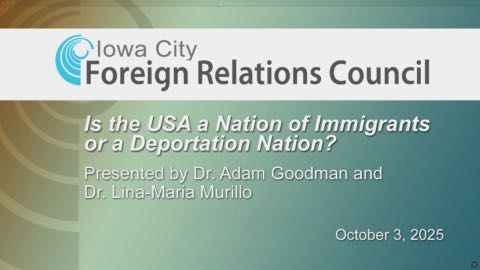
ICFRC - Indigenous Strength - Food Sovereignty and Language Revitalization
Recorded: October 13, 2025
Runtime: 00:00:00
Listen to an audio podcast of this program.

Coups d'etat are dramatic events that can have major and lasting implications for states. Negative effects include destroying democracies, spurring repression, and inviting warfare. Coups may also have more positive effects like ending civil wars and providing opportunity for democratic governance to emerge. The recent spike in coups aligns with a burgeoning scholarly interest in these events. The purpose of this talk is twofold. First, the nature of coups will be discussed along with the scholarly literature that examines causes and consequences of coups. Second, original research will be presented that explores an overlooked aspect of coups: education. While the bulk of coup research focuses on elite actors, the original research presented in this talk will focus on one important aspect of the civilian population, expecting that coups will be unlikely in highly education populations. As such, this talk will be interesting to a wide variety of audiences, including students who have rarely thought about coups, scholars who study coups as a primary research interest, and those who are concerned about future coups.
Clayton Thyne is a Professor in the Political Science department at the University of Kentucky. He currently serves as the Department Chair, having previously held positions as Director of Graduate Studies and as the co-founder and Director of the Peace Studies certificate program. Dr. Thyne 's research currently focuses on domestic conflict/instability, coups d'etat, regime types and democratization, and international education policy. His most recent work focuses on coups d'etat, civil war onset, and civil war duration. His book, How International Relations Affect Civil Conflict: Cheap Signals, Costly Consequences, was published by Lexington Books in 2009. Other published work can be found in The Journal of Politics, British Journal of Political Science, Social Science Quarterly, International Studies Quarterly, The Journal of Conflict Resolution, Comparative Political Studies, The Journal of Peace Research, Foreign Policy Analysis,and Conflict Management and Peace Science. He received his Ph.D. from the University of Iowa (2007); M.A., University of Iowa (2004); M.Ed., University of Saint Thomas-Houston (2003); B.A., University of Nebraska-Kearney (2001).
For more information on the Foreign Relations Council visit their website at https://www.icfrc.org/.

ICFRC - Indigenous Strength - Food Sovereignty and Language Revitalization
Recorded: October 13, 2025
Runtime: 00:00:00

ICFRC - Kosovo's Cultural Survival Through Literature and Education
Recorded: October 9, 2025
Runtime: 00:50:51

ICFRC - Is the USA a Nation of Immigrants or a Deportation Nation?
Recorded: October 3, 2025
Runtime: 01:27:47